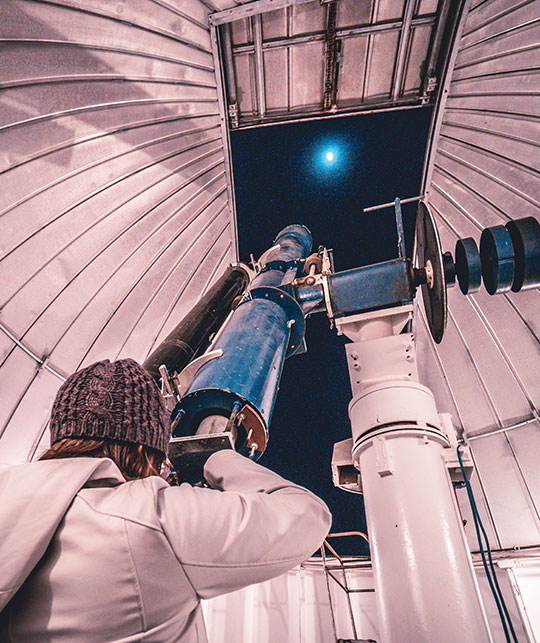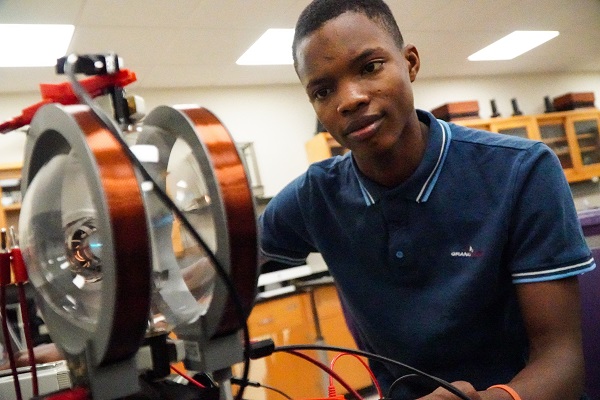
Physics (BS)
Deepen your understanding of the natural world through rigorous quantitative analysis
Our Bachelor of Science in Physics program offers a rigorous, quantitative approach to understanding the natural world. Differentiating itself from the Bachelor of Arts program, it features enhanced focus on challenging subjects like Quantum Mechanics and Electricity & Magnetism. You'll also gain expertise in scientific computing through our Computational Physics course and engage in essential independent research for a well-rounded scientific education.
All courses in section A below taken as part of the Physics major must be passed with a grade of
C or better; transferred courses must have approval from the Division of Physics and Astronomy
to receive major credit.
- Physics Courses: All must be taken (50 credits)
PHYS125 Physics I (4 credits)
PHYS126 Physics II (4 credits)
PHYS3xx (proposed) Mathematical Methods in Physics (3 credits)
PHYS325 Elementary Optics (3 credits)
PHYS326 Elementary Modern Physics (3 credits)
PHYS327 Computational Physics (3 credits)
PHYS341 Advanced Physics Lab (2 credits)
PHYS401 Quantum Mechanics I (3 credits)
PHYS402 Quantum Mechanics II (3 credits)
PHYS421 Statistical Mechanics (4 credits)
PHYS423 Classical Mechanics (4 credits)
PHYS424 Electricity and Magnetism I (3 credits)
PHYS454 Electricity and Magnetism II (3 credits)
PHYS450 Independent Study(2 credits)
Upper Level (3xx or 4xx) Astronomy or Physics Elective (minimum 3 credits)
Upper Level (3xx or 4xx) Astronomy or Physics Elective (minimum 3 credits) - Prerequisite Courses: All must be taken (23 credits)
CSCI156 Computer Science I (4 credits)
MATH151 Calculus I (4 credits)
MATH152 Calculus II (4 credits)
MATH253 Calculus III (4 credits)
MATH271 Differential Equations (3 credits)
MATH371 Linear Algebra (4 credits) - College, University, and Elective Requirements:
University Requirements (8 credits)
Wellness, Physical Education, Global Perspectives, Common Ground
CLAS General Education Requirements (40 credits)
Ten additional courses (I, I, II, II, A, B, C, D, E, E) (40 credits) one of which meets the First
Year Experience (FYE) requirement
Free electives to meet the college total of 124 total credits (3 credits)
PHYS125 and PHYS126 satisfy the Natural Science requirement (F)
In addition to fulfilling the requirements of the Physics BS major, as well as the College of Liberal Arts & Sciences general education requirements, you'll be required to complete the College's First Year Experience Program or Transfer Student Program.
Unlike the primary major, the Physics double major does not require a concentration. Instead, the double major requires 8 credits of electives from a single list of courses covering all those in the concentrations. This structure gives students greater flexibility in choice of electives and is more relevant in the context of a double major.
The Physics double major may not be combined with the BA in Physics, the BS in Physics, or the BS in Astrophysics due to extensive overlap.
All courses in sections A and B below taken as part of the Physics major must be passed with a
grade of C or better; transferred courses must have approval from the Division of Physics and
Astronomy to receive major credit.
LEARN MORE ABOUT DOUBLE MAJORS
A. Physics Courses: (29-30 credits)
- PHYS 125 Physics I
- PHYS 126 Physics II
- PHYS 324 Mathematical Methods in Physics
- PHYS 325 Elementary Optics
- PHYS 326 Elementary Modern Physics
- PHYS 341 Advanced Physics Lab
- PHYS 401 Quantum Mechanics I
- PHYS 421 Statistical Mechanics
- PHYS 423 Classical Mechanics
- PHYS 424 Advanced Electricity and Magnetism I
B. Electives: (8 credits) Choose a minimum of 8 credits from the following:
- Upper Level (3xx or 4xx) Physics courses not required above
- Upper Level (3xx or 4xx) Astronomy courses
- CEMS 344* Properties II: Electrical, Magnetic, and Optical
- CEMS 347* Spectroscopy (2 credits)
or CEMS 349* X-ray Characterization - CEMS 501** Solid State Physics
- MECH 321* Thermodynamics II
- MECH 324* Fluid Mechanics I
- MECH 415* Mechanical Vibrations I
C. Prerequisite Courses: All must be taken (12 credits)
- MATH 151 Calculus I
- MATH 152 Calculus II
- MATH 253 Calculus III
* These courses have prerequisites outside of the Division of Physics and Astronomy.
** Undergraduates in good standing may request permission to take graduate courses.
Physics Minor:
PHYS 125 Physics IPHYS 126 Physics II
PHYS 325 Elementary Optics
PHYS 326 Elementary Modern Physics
8 hours of 300 and/or 400 level courses in physics (4 hours may be taken in astronomy).
*Note: Since 300 and 400 level physics courses are only offered in alternate years, be careful scheduling.
A degree in Physics prepares students for a wide range of careers. According to the Institute of Physics, about one third of all physicists work in public service industries, one third in private industry, and one third in secondary and higher education. Physics graduates are qualified to work in career fields such as astronomy, medicine, engineering, research, computing, and even finance.
Recent examples include:
- Teaching Assistant – University of Toledo
- Measurements Engineer – Corning Incorporated
- Toxicologist – New York Hospital
- Engineer – EMS Technologies
- Engineer – Mercury Corporation
Student Stories
News
Similar Programs
Considering majoring in the Physics BS but like the idea of having more career options after graduation? You should consider the Physics BA, adding a second major or minoring in a related program.




